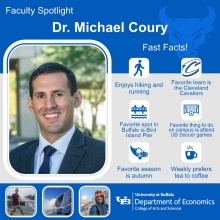Faculty Spotlight – Dr. Michael Coury
Dr. Michael Coury is an applied microeconomist with research interests in public economics, environmental economics, and economic history. He received his PhD in Economics from the University of Pittsburgh. You can find him teaching Public Economics (ECO 464/564 and ECO 764), Environmental Economics (ECO 412/512 and ECO 796), and Econometrics (ECO 480/580)!

Faculty Spotlight
Why did you choose economics? Why did you choose your subfield?
MC: I love that the tools of economics are so useful in understanding and trying to address the world’s biggest problems. It’s a lot different from engineering, my first field, where the problems are often hyper-specific, such as studying one protein in a cell cascade. The questions I am most drawn to include the environment, climate change, and how public policy is formed.
What research are you working on right now?
MC: I have a couple projects related to how natural disasters influence the types of environmental policies citizens and politicians will support. I am also working on historical economics research on how water quality and crime shaped the development of American cities.
What was your favorite paper to write, and why?
MC: Climate Risk and Preferences over the Size of Government, because it combined data from a wide variety of sources (wildland firefighting perimeters, precinct-level voting, nonprofit citizen organizations) into a single paper with a lot of pretty maps.
What is your favorite class to teach and why?
MC: Public economics. The government is huge- over 35% of the economy- and economic policy is in the news every day, so it’s highly relevant. Plus, as an upper-level elective, it’s cool to see students take all the theory and data skills they’ve learned and apply them to policy problems that interest them.
What was your favorite class as an undergrad?
MC: Public economics- notice a trend? I found it incredibly empowering. Before this class, I was at the mercy of talking heads on tv when trying to think about economic policy. After this class, I could use math, economic theory, and hard data to decide for myself. I also had an incredible professor who was not only an excellent researcher but also a transformative advisor and mentor.
What is your top piece of advice for your students?
MC: Do something- an internship, a research experience, taking ownership of a student organization, networking opportunities, etc. It’s ok not to have your whole life planned, and your something doesn’t have to be a perfect fit. If you’re applying yourself and pushing your skills, you’ll find those experiences help you find your path.